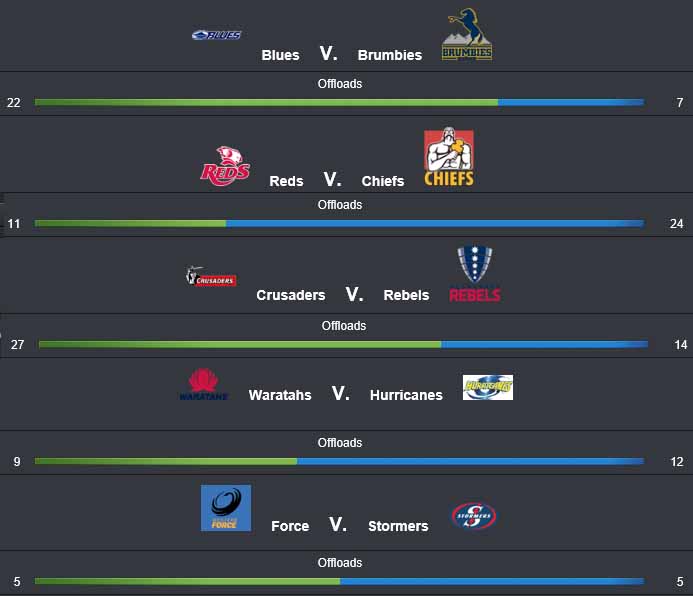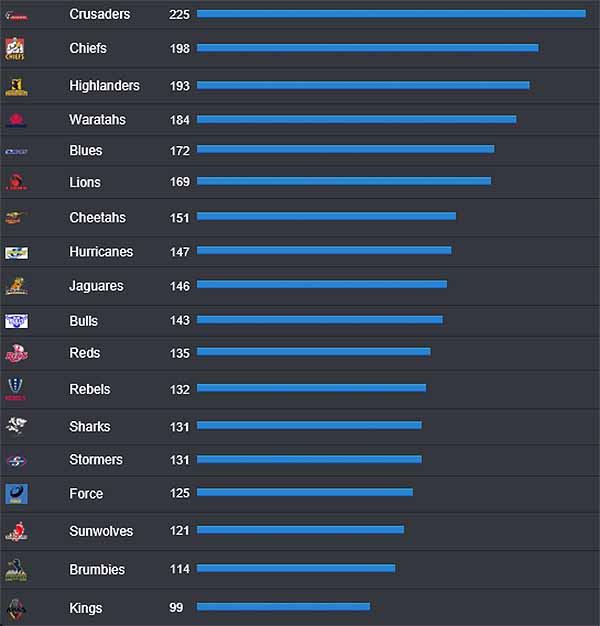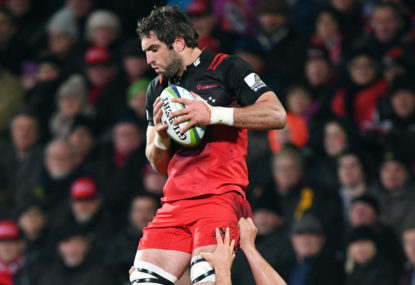There’s no two ways about it, that was a rough weekend of rugby results for the Australian team.
The stat trotted out on Saturday night was that this was the first time since April 2005 that all five Australian teams have lost in the same weekend, but it’s much, much worse than that.
It’s the first time in the history of the universe that all five Australian teams have lost in the same weekend!
Back in Round 7 2005, there were of course only three Australian teams to lose. And Round 7 2005 was the first time the three Australian teams had lost since… well, only the week before. In truth, all three Australian teams losing on the same weekend was somewhat common; eight times in the ten seasons of Super 12, in fact.
Considering all the commentary there’s ever been around the quality of five Australian teams, and whether there was or is enough depth to cover five teams, it’s actually a wonder that it’s taken five-and-a-half seasons for five teams to lose on the same weekend. And it’s equally interesting that it never happened at all when a fourth Australian team was added.
But regardless of the semantics of that particular stat, the pain of five losses in a weekend is going to take some time. And it’s going to take some time, because there’s a symptom that is afflicting Australian rugby across the board that just cannot be fixed in a week.
One common element in the five Australian losses, was a chronic lack of second-phase play. Offloads were occasional events, rather than distinct plans, as the Australian players across the weekend hit the ball up directly into defensive walls with no real intent to look sideways.
If that sounds familiar, it’s because it is. I’ve essentially summarised the Wallabies’ game plan for the First and Third Tests against England last month. Despite enjoying upwards of 70 per cent of possession at times in both Tests, the Wallabies continued their ultimately futile attempts at blasting their way through the England defence.
In both matches, the Wallabies carried the ball more than 130 times, yet could manage only 13 offloads in the First Test, and just eight offloads in the Third. Less than once in every ten carries did they get an offload away, meaning that more often than not they weren’t even attempting to promote the ball.
Back in April, Waratahs coach Daryl Gibson was criticised in certain quarters for laying the finger of blame for the evident skills and decision-making deficiency on the Wallabies coach a decade ago.
“It’s a structural thing,” Gibson said at the time.
“The difficulty for us is I think the Eddie Jones era of playing A-B-C-certain type of rugby, that lack of decision making has had an effect on Australian rugby in the fact that it’s very pervasive across the schooling system.
“And then so we tend to get our boys at 18 and probably their skills are very good but they’re just missing the decision making in an open environment.”
Offloads aren’t the be-all and end-all of rugby, but they’re a decent indicator of how teams and individuals look to play within their skillsets. And on the weekend’s evidence, it’s true that both Gibson did indeed have a point, and that Australia’s playing skillsets are falling a long way behind the level required for Super Rugby and beyond.
Here’s the offload figures from the weekend’s games, and it makes for mostly depressing reading.

If the Brumbies really did get seven offloads away, then my guess is that at least five of them came in the last five or so minutes, when their chase of the game became more desperate. Prior to that, they remained steadfastly adhered to their set piece and lineout drive game.
The Reds managed 11 offloads for the match, apparently, yet the individual player stats only add up to seven. Either way, Chiefs’ tighthead Atu Moli’s try in the 12th minute came after eight offloads and two phases that originated with a scrum and a kick-pass back on their own ten metre line.
In any other round it would be a Try of the Week certainty, but the field this weekend means it might do well to make the top five.
When was the last time an Australian side scored a try off four offloads, never mind eight?
Sadly, this offload drought is not a new thing. The season stats read just as poorly.

The Waratahs sit among the top five offloading teams, which is something, and it’s certainly true that they have been the one Australian team who have looked to offload as part of their game plan. But nine on the weekend against the Hurricanes really isn’t a lot, and that figure follows the 17 offloads they got away in putting 57 points and nine tries on the Sunwolves the weekend before.
The other four Australian sides sit in the bottom eight teams in terms of offloads for the season, with the Brumbies sitting above only the Southern Kings. It won’t surprise anyone that of the top dozen or fifteen try-scorers in 2016, Stephen Moore is the only Brumby and the only forward.
Curiously, after the England whitewash, Wallabies coach Michael Cheika made the puzzling declaration that fitness was the major area of improvement his side needed.
“We’ve got to get a little fitter,” Cheika said as the post-mortems began.
“If we want to play this much footy, we’ve got to be a little fitter.”
Teams can always be fitter, on that point I will agree, but I would argue that he wants the Wallabies to dominate possession and play as much as they did during the England series, playing smarter has to a much higher priority.
Passing the ball 130 times in a Test won’t win the match if those passes are made at depth, and well before the gain line. Playing flatter, and getting the ball through the gain line on to supporting runners is where ground will be made, and the match-winning momentum created.
Instead – and we see this now in Super Rugby – support runners are rare, and it’s a classic chicken and egg situation. Do Australian players not run support line because offloads aren’t really being thought about, or do Australians not offload because there’s no support runner?
It’s a simple skill of the game. If the ‘Australian way’ of playing the game is all about ball in hand, then there has to be some smarts and some skill about it. If Australian teams want to pass well behind the gain line, then teams will just wait – and are just waiting – and slide their defences accordingly. It’s exactly what England did in the June Tests, and it’s exactly what four Kiwi teams and the Stormers did on the weekend.
Former All Black skills coach Mick Byrne has been telling us all season how long it took for the All Blacks to develop the skill levels they take for granted now. And it’s great that Byrne is telling us this, but the ARU should be moving heaven and earth to put him in a full-time role focussing on improving the skills of Australian players.
Chris Malone was a handy player back in his day, but it’s clear by the lack of offloads and the number of kicks not finding touch that his part-time skills coach job sharing arrangement between the Waratahs and the Wallabies is not working.
The ARU should just starting writing numbers on a cheque until Byrne says yes. And if the suggestion is that Australian rugby can’t really afford that, then I’ll point you to the current mountain of evidence that very clearly shows that Australian rugby can’t afford NOT to have someone building the national skill levels.
This won’t solve the situation before the Super Rugby playoffs, obviously – or the first week of the playoffs, and quite possibly not beyond that – but doing nothing and hoping the situation will improve is the very definition of madness.
Something clearly has to change, or it’s only going to get worse.































































































